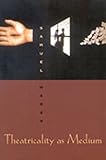Theatricality as Medium / Samuel Weber.
Material type: TextPublisher: New York, NY : Fordham University Press, [2009]Copyright date: ©2009Description: 1 online resource (414 p.)Content type:
TextPublisher: New York, NY : Fordham University Press, [2009]Copyright date: ©2009Description: 1 online resource (414 p.)Content type: - 9780823224159
- 9780823238675
- 792.01 22//oclceng
- online - DeGruyter
| Item type | Current library | Call number | URL | Status | Notes | Barcode | |
|---|---|---|---|---|---|---|---|
 eBook
eBook
|
Biblioteca "Angelicum" Pont. Univ. S.Tommaso d'Aquino Nuvola online | online - DeGruyter (Browse shelf(Opens below)) | Online access | Not for loan (Accesso limitato) | Accesso per gli utenti autorizzati / Access for authorized users | (dgr)9780823238675 |
Frontmatter -- Contents -- Preface -- Prior Publication -- Introduction: Theatricality as Medium -- 1. Theatrocracy; or, Surviving the Break -- 2. Technics, Theatricality, Installation -- 3. Scene and Screen: Electronic Media and Theatricality -- 4. Antigone’s Nomos -- 5. The Place of Death: Oedipus at Colonus -- 6. Storming the Work: Allegory and Theatricality in Benjamin’s Origin of the German Mourning Play -- 7. ‘‘Ibi et ubique’’: The Incontinent Plot (Hamlet) -- 8. Kierkegaard’s Posse -- 9. After the End: Adorno -- 10. Psychoanalysis and Theatricality -- 11. ‘‘The Virtual Reality of Theater’’: Antonin Artaud -- 12. Double Take: Acting and Writing in Genet’s ‘‘The Strange Word Urb’’ -- 13. ‘‘Being . . . and eXistenZ’’: Some Preliminary Considerations on Theatricality in Film -- 14. ‘‘War,’’ ‘‘Terrorism,’’ and ‘‘Spectacle’’: On Towers and Caves -- 15. Stages and Plots: Theatricality after September 11, 2001 -- Appendix -- Notes -- Index
restricted access online access with authorization star
http://purl.org/coar/access_right/c_16ec
Ever since Aristotle's Poetics, both the theory and the practice of theater have been governed by the assumption that it is a form of representation dominated by what Aristotle calls the "mythos," or the "plot." This conception of theater has subordinated characteristics related to the theatrical medium, such as the process and place of staging, to the demands of a unified narrative. This readable, thought-provoking, and multidisciplinary study explores theatrical writings that question this aesthetical-generic conception and seek instead to work with the medium of theatricality itself. Beginning with Plato, Samuel Weber tracks the uneasy relationships among theater, ethics, and philosophy through Aristotle, the major Greek tragedians, Shakespeare, Kierkegaard, Kafka, Freud, Benjamin, Artaud, and many others who develop alternatives to dominant narrative-aesthetic assumptions about the theatrical medium. His readings also interrogate the relation of theatricality to the introduction of electronic media. The result is to show that, far from breaking with the characteristics of live staged performance, the new media intensify ambivalences about place and identity already at work in theater since the Greeks. Praise for Samuel Weber: “What kind of questioning is primarily after something other than an answer that can be measured . . . in cognitive terms? Those interested in the links between modern philosophy nd media culture will be impressed by the unusual intellectual clarity and depth with which Weber formulates the . . . questions that constiture the true challenge to cultural studies today. . . . one of our most important cultural critics and thinkers”—MLN
Mode of access: Internet via World Wide Web.
In English.
Description based on online resource; title from PDF title page (publisher's Web site, viewed 03. Jan 2023)


